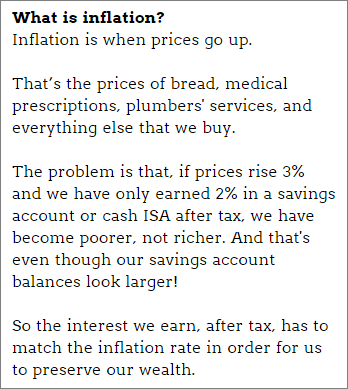To get the best lending results, compare all P2P lending and IFISA providers that have gone through 4thWay’s rigorous assessments.
Why the Bank of England Cares What We Think
 Where is the Bank of England taking us? And how does it trick us into letting it do so?
Where is the Bank of England taking us? And how does it trick us into letting it do so?
The Bank of England does a quarterly poll to see where ordinary people think inflation is going.
It's last survey was in February. Please allow me to tell you about its results before I get to the point.
Low expectations
The people polled guessed that inflation will be 1.9% over the next 12 months.
This is the lowest average guess in 13 years.
We're losing track of reality
The survey also showed that people think, on average, that inflation has been 2.2% over the 12 months to the end of January 2015.
In reality, inflation has gone down by three-quarters from 2.1% to 0.5%. (Based on the Jevons Retail Prices Index – RPIJ, which is probably the Office for National Statistics' most accurate and comprehensive measure of inflation).
It's not surprising that consumers hadn't realised this, in my opinion. I read financial news quite regularly and yet this plummet had passed me by too.
Note that the 0.5% inflation that occurred over the 12 months to end January 2015 has no bearing on inflation over the next 12 months. Just as 2.1% by the end of January 2014 clearly had no bearing on what came next!
Mark Carney, the Governor of the Bank of England, doesn't see the current low inflation being the model for the next few months. He said that we will actually experience deflation in the coming months, although the Bank thinks it will be short-lived.
Why does the Bank of England survey expectations?
The Central Bank writes on its own website: “An important influence on households’ and companies’ wage and price-setting behaviour is inflation expectations.”
So when the Bank is forecasting upcoming inflation and deciding whether to change interest rates it needs to take into account what the people think.
Check expectations – and keep them in check
However, there is a much more important reason for checking expectations.
One of a Central Bank's duties is to help print money while it talks down expectations of inflation. When necessary, it prints and talks much faster, as it has done in recent times.
Lower expectations actually slow inflation and spread it out over a longer period. But it doesn't get rid of it.
Even if there are forces lowering inflation now, as apparently there are, the money will eventually be spent, and will be spent again, at a faster rate. When all the spare extra money starts swimming around, prices will have to rise sharply to catch up. Maybe not today, maybe not even in five years, but at some point.
This isn't some sort of crazy conspiracy theory. If you read textbooks on economics (my colleague Neil recalls you can get this in the Economics for Dummies book, for example, which shows you roughly our level of economics training*) you'll see that this is accepted as fact: Central Banks talk down inflation because it works. It stops us buying – or investing in – more things now, before prices rise.
But no matter what else is affecting prices, the talking-down effect isn't permanent. Prices do catch up.
Reversing money printing
Technically the Bank of England can reverse money printing by destroying money, but if you bone up on it you'll find quite a few aspects that could make it very difficult to do so. You need luck to get the timing right. Worse, it always has consequences, just as money printing does. And just as raising or lowering interest rates does. And just as raising or lowering taxes does!
Basically any big change in policy has both positive and negative effects.
Just to take one example of the negative effects of destroying money, it could be unbearable for the government to allow it. It would make government borrowing harder and more expensive for starters, just as money printing makes it cheaper and easier.
What does this mean for us P2P lenders?
I haven't the foggiest idea what any of this means for those of us who are saving and investing, except that we should probably always be prepared for the worst.
We don't know when there'll be major moves in inflation, just as we don't know when the massive global and UK debt bubble will burst.
I think a mix of savings and investments makes sense regardless of what happens. That's some in savings accounts, some in your own property, some in the stock market and some in P2P lending.
And, within peer-to-peer lending, spread your money across hundreds of the safest loans and across several of the safest P2P lending companies.
Because I think that a lot of people are eventually going to regret taking higher risks.
*That might not be such a bad thing. It reminds me of a dialogue exchange in the classic comedy TV series “Yes, Prime Minister”, after the Prime Minister had a furious meeting over a sudden financial crisis:
PM: “Bernard, Humphrey should have seen this coming and warned me.”
Bernard: “I don't think Sir Humphrey understands economics, Prime Minister; he did read Classics, you know.”
PM: “What about Sir Frank? He's head of the Treasury!”
Bernard: “Well I'm afraid he's at an even greater disadvantage in understanding economics: he's an economist.”


